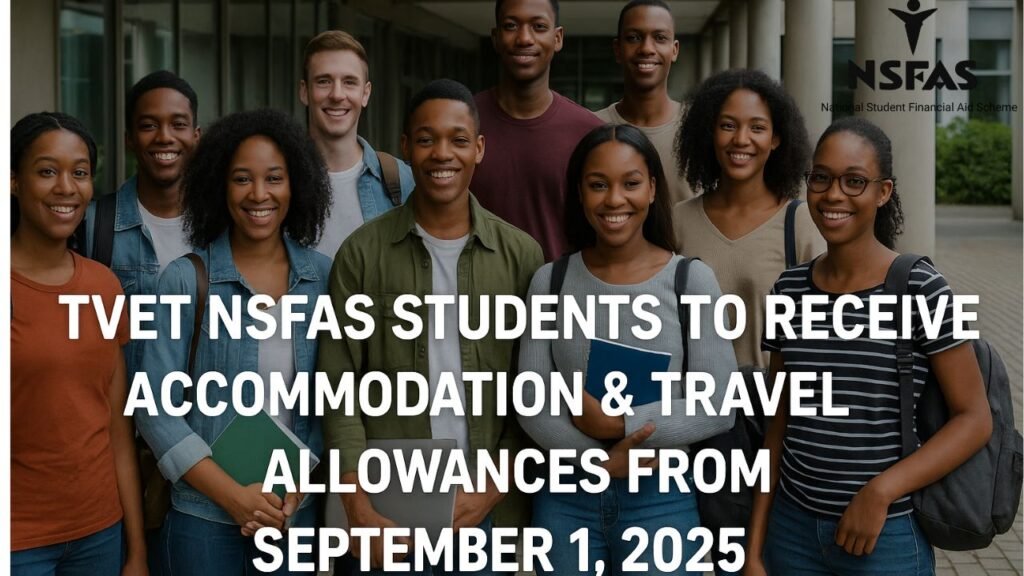Accommodation & Travel Allowances – In a significant move aimed at supporting students in technical and vocational education, the National Student Financial Aid Scheme (NSFAS) has announced that eligible TVET (Technical and Vocational Education and Training) college students will begin receiving accommodation and travel allowances from September 1, 2025. This initiative is part of a broader effort to improve student welfare, reduce dropout rates, and address long-standing concerns about the accessibility and affordability of education for underprivileged learners across South Africa.

Purpose Behind the Allowance Rollout
The introduction of these allowances reflects the government’s recognition of the unique challenges faced by TVET students, particularly those who come from rural or disadvantaged backgrounds. Many of these students travel long distances to attend classes or are forced to live in unsafe or overcrowded accommodations. By offering financial support for travel and housing, NSFAS aims to remove these barriers and allow students to focus fully on their studies without the burden of daily commuting costs or unstable living arrangements.
Who Qualifies for the New NSFAS Allowances?
According to the latest update, all NSFAS-funded students enrolled in accredited TVET colleges will be considered for the accommodation and travel allowances. The specific criteria include active registration with a public TVET institution, financial need as assessed by NSFAS, and compliance with academic performance requirements. Students who stay far from their campus will be eligible for travel allowances, while those residing in or around campus premises may receive funding for accommodation, provided it meets the scheme’s safety and quality standards.

How and When Payments Will Be Made
NSFAS has confirmed that the disbursement of the new allowances will commence on September 1, 2025. The funds will be deposited directly into the students’ bank accounts or NSFAS-issued payment wallets. To streamline the process and prevent fraud or delays, NSFAS has partnered with various digital financial service providers to ensure fast and secure payments. Students are encouraged to verify their banking details and ensure all required documents are up to date on the NSFAS portal to avoid any disruptions in receiving their funds.

Focus on Student Welfare and Academic Success
The provision of accommodation and travel allowances is more than just a financial aid mechanism—it is a student welfare strategy. NSFAS and the Department of Higher Education and Training believe that when students have secure housing and reliable transportation, their academic performance improves significantly. Lack of access to these basic needs has often resulted in high dropout rates and poor academic outcomes, particularly in TVET colleges. This policy aims to reverse that trend by creating a more supportive and equitable learning environment.
Challenges in Previous Funding Models
Prior to this announcement, TVET students frequently voiced frustration over the inconsistent and delayed distribution of funds. Many students were left to fend for themselves without formal support for housing or commuting, which led to increased absenteeism, poor academic results, and emotional stress. The new allowance rollout is designed to standardize the financial support process for all NSFAS beneficiaries and to eliminate the confusion and inequality that plagued earlier funding models.
Government’s Long-Term Vision for TVET Education
The government’s focus on strengthening TVET education is part of a broader national plan to build a skilled workforce that can meet the demands of a modern economy. By making TVET colleges more accessible and student-friendly, authorities hope to encourage more youth to pursue technical and vocational careers, which are essential for economic growth and job creation. This new funding initiative is expected to boost enrollment numbers, especially among students from historically disadvantaged communities.
Student Response and Institutional Preparedness
Early feedback from students and educational institutions has been largely positive. Many students have expressed relief and gratitude for the upcoming support, stating that it will enable them to focus better on their training and professional development. TVET college administrators, meanwhile, are preparing their systems to handle the new allowance logistics. NSFAS has committed to working closely with these institutions to ensure a smooth transition and to resolve any challenges that may arise during implementation.
The rollout of accommodation and travel allowances for TVET NSFAS students marks a pivotal step in making education more inclusive and supportive. With implementation beginning on September 1, 2025, thousands of students across South Africa will finally receive the assistance they need to study with dignity and stability. This initiative not only supports students in the short term but also contributes to the long-term transformation of the country’s vocational education sector.





